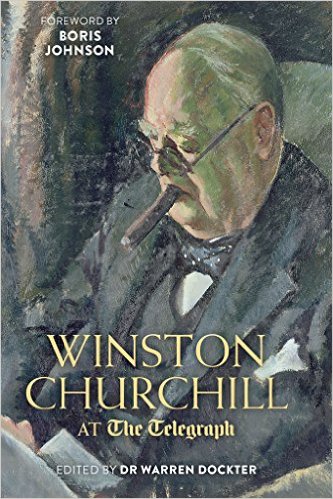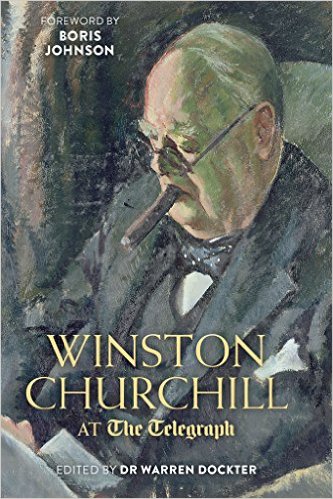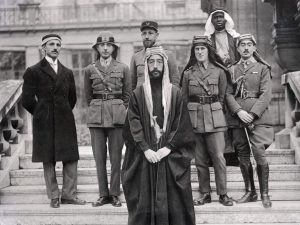Finest Hour 169
Books, Arts, & Curiosities – The Statesman as Journalist

November 10, 2015
Finest Hour 169, Summer 2015
Page 43
Review by Catherine Katz
Catherine Katz is a 2013 graduate of Harvard and received her Masters in History at Cambridge in 2014. She works as a financial analyst in New York.
Winston Churchill at The Telegraph, ed. Warren Dockter,
London: Aurum Press, 277 pages, £16.99, US$ 26.99, CAN$ 29.99.
ISBN 978-1781314524
 At first glance Winston Churchill at The Telegraph may appear to be a narrow lens through which to examine a giant of history. However, this new work, edited by Warren Dockter with a preface by Mayor Boris Johnson, provides a sweeping view of our hero’s endeavors throughout his nearly seventy-year relationship with the Daily Telegraph. Not only does it feature Churchill in his usual role as statesman, but it also provides perspective on a man who played numerous roles throughout his life, including soldier, artist, author—and a man who loved his pets.
At first glance Winston Churchill at The Telegraph may appear to be a narrow lens through which to examine a giant of history. However, this new work, edited by Warren Dockter with a preface by Mayor Boris Johnson, provides a sweeping view of our hero’s endeavors throughout his nearly seventy-year relationship with the Daily Telegraph. Not only does it feature Churchill in his usual role as statesman, but it also provides perspective on a man who played numerous roles throughout his life, including soldier, artist, author—and a man who loved his pets.
Winston Churchill at The Telegraph is less a scholarly endeavor than a celebration of his long-term partnership with one British newspaper. The book abounds with Churchillian insights and anecdotes and would make an excellent gift for a reader already familiar with Churchill and his influential, yet eclectic, life.
The often-entertaining selection of Churchill’s writing showcased in this new volume at times fills the reader with nostalgia for a bygone era. Who other than Churchill could write something so charming as the notion that polo—the sport of kings—is actually the great equalizer? He writes from India in 1898: “Polo has been the common ground on which English and Indian gentlemen have met on equal terms, and it is to that meeting that much mutual esteem and respect is due.”
Churchill was also ahead of his time. Dockter makes strong editorial decisions when illustrating Churchill’s keen understanding of the future implications of foreign and domestic policy. Churchill’s March 1930 commentary forewarns of the challenges Britain faces should systemic abuse of the “dole” continue in the face of an aging population, and in 1948 he urges future leaders to be wary of the potential for violent dictatorships to fill the void of Imperial governance in countries such as the present-day Myanmar (then known as Burma).
While Dockter prefaces each chapter with a paragraph or two of historical context, a more robust introduction to each chapter would have provided a better frame of understanding for the many facets of modern history’s most impressive character. Oddly, the most thorough chapter preface is not about Churchill’s statesmanship or writing, but rather about his fondness for his pets.
Dockter’s best editorial adroitness appears in the chapter “Churchill and Europe.” The selection of articles, especially those written by Churchill himself, reminds us of his enduring relevance in our own time, particularly now that the future of the European experiment is uncertain. The economic challenges posed by a single currency continue, and Britain itself faces a referendum that fundamentally questions whether Britons see themselves as Europeans. Churchill was an early champion of a pan-European governing body, united defense capabilities, and a single currency. He astutely recognized that “it may well be that everybody cannot join the club at once,” but “the beginning must be made. The nucleus must be formed in relation to the structure as a whole.” He describes this nucleus as a firm partnership between a reconciled France and Germany, a partnership that is currently questionable at best.
However, Churchill does not lay all the responsibility for future European peace and prosperity in the hands of Europeans themselves. Dockter’s inclusion of a 1946 article reminds us of Churchill’s early understanding of globalization and the knotted fortunes of Europe and the United States: “Isolationism is no more. The Atlantic Ocean is no longer a shield. The Pilgrim Fathers could now cross it in a day; but the troubles from which they fled and the tyrannies against which they revolted can follow just as quick.”
The realities of the globalized world, as Churchill and Dockter warn, unfortunately mean that localized problems very quickly cease to be local. Churchill’s words in the Telegraph in 1946 could have been written today: “The peace and safety of the United States of America requires the institution of a United States of Europe. It is better to face…the remote potential antagonism of two continental groupings than to be dragged for certain into one toil and horror after another by chronic degeneration and the blind convulsions of chance.”
It comes as no surprise that Churchill’s own words, taken from a book review on First World War naval operations, provide the best overall analysis of Winston Churchill at the Telegraph: “The result is a sort of official amalgam which seems to be neither a plain, fearless narrative nor a fair and searching analytical examination” that this lion of history deserves. However, “This carefully jumbled mass of incident and detail is a veritable treasure-house of information” about the man who will continue to fascinate the world for many years to come.
Subscribe
WANT MORE?
Get the Churchill Bulletin delivered to your inbox once a month.





